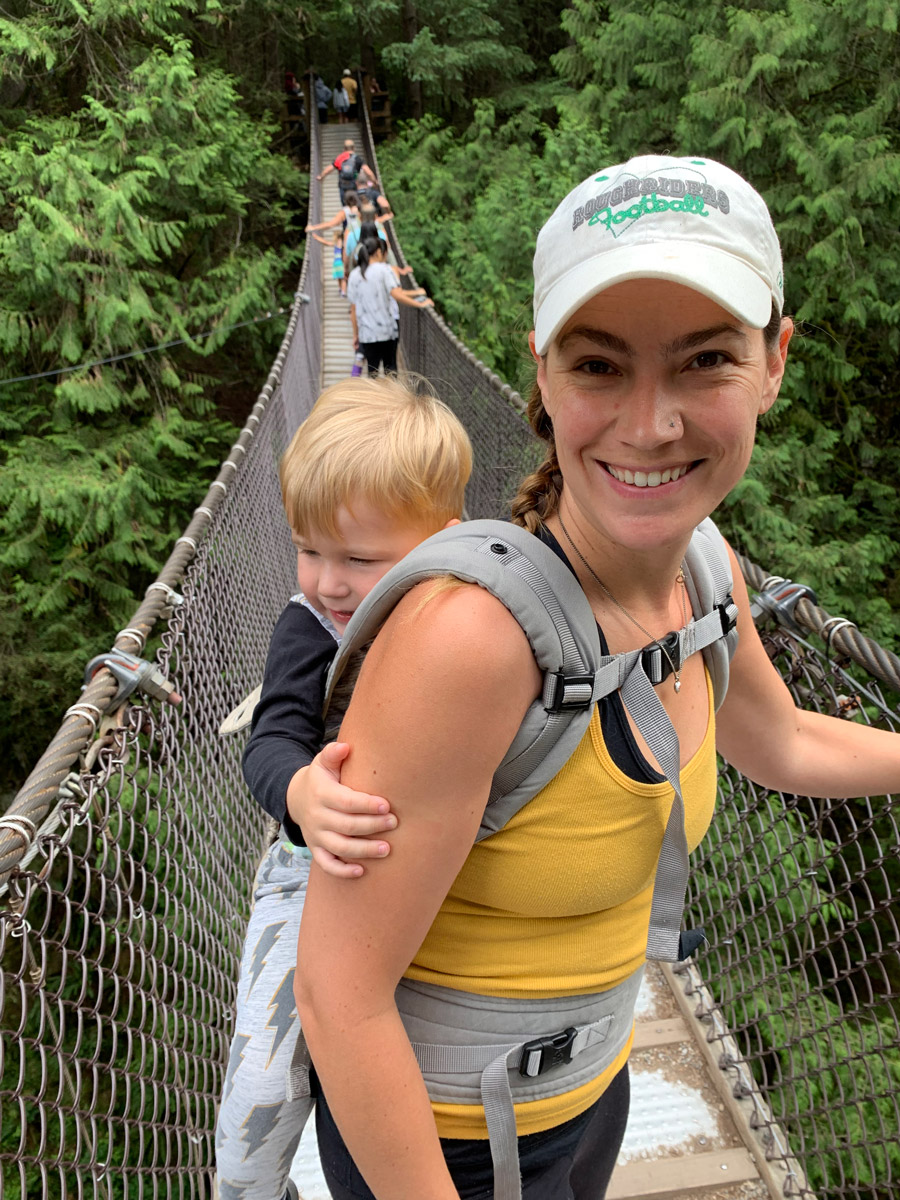Sep 24, 2019

Rebecca Sovdi is a Registered Dietician and a Senior Policy Analyst with the FNHA with a portfolio in Healthy Living. She is shown here with her son on a hike in Lynn Canyon Park in North Vancouver.
As we enter the last week of the FNHA's 30x30 Active Challenge, Registered Dietician Rebecca Sovdi provides these tips for healthy eating – an important adjunct to our 30x30 focus on active living.
When we talk about wellness and wholistic health, the most common way to describe those concepts is that they are about balance. Balance in all four aspects of our lives; physical, spiritual, mental, and emotional. One of the key contributing factors to being balanced in all four aspects is through healthy eating and having a good relationship with food and the land.
The FNHA 30x30 Active Challenge is about so much more than just increasing our physical health. Moving our bodies in joyful ways and in environments or with people that we enjoy being around contributes to balance in all areas of wellness. Similarly, eating foods that we enjoy with people that we love has many benefits to our overall well-being. In this blog post, we are sharing a few ideas around food and nutrition to support you through the final days of the challenge and beyond.
Focus on Good Food
Health Canada released a new Food Guide earlier in 2019, which places emphasis on where, when, why and how you eat in addition to what you eat. The food guide makes the following recommendations:
Be mindful of your eating habits - Take time to eat and pay attention to your body's natural hunger cues; notice how you feel when you are hungry and when you are full.
Cook often and eat meals with others – When we cook at home, we are more likely to prepare foods made from fresh, nutritious ingredients. Prepare by doing menu planning, shopping for what is on sale, and choosing recipes that you and your family enjoy. Sit down around the dinner table with your family and loved ones.
Enjoy your food – This one is my favourite! Choosing foods that you enjoy is beneficial to your physical, mental, and emotional health. This includes the traditional foods you enjoy most, or gathering foods in ways that you enjoy including hunting, gathering, and fishing.
Balance of the foods that we eat is important when it comes to food fuel before, during, and after exercise. Carbohydrate, protein, and fat are all important nutrients that each have an important role in the body. Carbohydrate is the body's preferred source of energy, so choosing whole grains daily will enable you to perform your best during activity. Protein is the body's building blocks for muscle growth and healing. Canada's Food Guide recommends consuming plant-based proteins more often in addition to protein from lean meats, eggs, lower fat dairy products, fish and shellfish. Last, but not least, choosing healthy unsaturated fats is important for organ function, energy balance and absorption of some vitamins. Focusing on foods as close to their natural state as possible, and reducing ultra-processed foods, are also important aspects of a healthy and balanced diet.
The fluids we choose are also important. Water is vital for life - it provides the body with hydration without adding excess calories, sugar or salt. Lower-fat dairy products or plant-based beverages are also healthy choices for hydration. Sports drinks are not typically recommended for activity that lasts less than 60 minutes, as they have no beneficial impact and can add excess sugar to the diet.
For more information about healthy eating, check out Canada's Food Guide and Dietitians of Canada.
Wellness not Weight
A very wise and experienced obesity physician in Canada, Dr. Arya Sharma, says that “health is not measured in pounds." This is an important message because modern society often leads people to believe that being thin is associated with being well. Not only does this myth contribute to poor treatment of heavier people, it is also simply not true. Science has shown that being fit at any body size is a significantly more important factor in health than weight.
When we challenge ourselves, or our friends and family to increase our activity, we should be doing so with the goal of achieving wholistic health and balance. It's OK to want to shed a few pounds, if that is your goal, but keep in mind that any amount of movement is contributing to your health and wellness. Keep in mind that a safe and healthy amount of weight loss is typically no more than one to two pounds per week. Any more than that and your body is likely to think that it is in starvation mode and it will set into motion survival responses, such as storing energy (calories) or breaking down muscle mass.
30x30 Reminder – Active Hour Sept. 29
Mark your calendars for Sept. 29 between 10 – 11 a.m. for the Active Hour! That's when we will get together with family, friends or community members for a group walk/run or other physical activity.
During the Active Hour, Dr. Evan Adams, the Chief Medical Officer of the FNHA, will be at the Rainforest Trail Run in Burnaby. You can still register and join Evan and his team for this inaugural five-kilometer run that is celebrating the health and vibrancy of Indigenous Cultures of BC. For those who can't be at the Rainforest Trail Run, Dr. Evan Adams will be connecting with everyone through a Facebook Live Event that will be shared from both his and the FNHA's Facebook accounts starting Sunday at 10 a.m.
30x30 Reminder – Prize Draw
For your next chance to win a $150 gift card to Sport Chek, post a photo, video or post sharing your small victories, positive changes and healthy habits. We want to hear and share the amazing work everyone has been doing in September. The draw deadline is Sept. 30 at noon.
Use the hashtags: #30x30ActiveChallengeFNHA, #BeActiveFNHA, and #FNHAwellness or email Active@fnha.ca.
Congratulations to Jay-Lee Vipond from Kispiox who won the previous draw for sharing her first hockey practice photo. The theme of that draw was “do activities with others."


